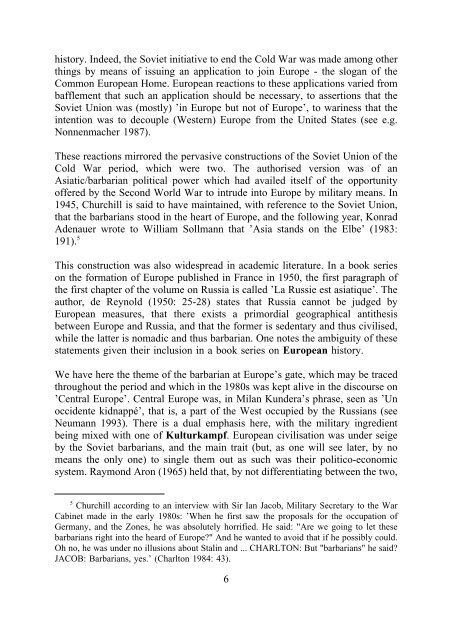RUSSIA AS EUROPE'S OTHER Iver B. Neumann European ...
RUSSIA AS EUROPE'S OTHER Iver B. Neumann European ...
RUSSIA AS EUROPE'S OTHER Iver B. Neumann European ...
You also want an ePaper? Increase the reach of your titles
YUMPU automatically turns print PDFs into web optimized ePapers that Google loves.
history. Indeed, the Soviet initiative to end the Cold War was made among other<br />
things by means of issuing an application to join Europe - the slogan of the<br />
Common <strong>European</strong> Home. <strong>European</strong> reactions to these applications varied from<br />
bafflement that such an application should be necessary, to assertions that the<br />
Soviet Union was (mostly) ’in Europe but not of Europe’, to wariness that the<br />
intention was to decouple (Western) Europe from the United States (see e.g.<br />
Nonnenmacher 1987).<br />
These reactions mirrored the pervasive constructions of the Soviet Union of the<br />
Cold War period, which were two. The authorised version was of an<br />
Asiatic/barbarian political power which had availed itself of the opportunity<br />
offered by the Second World War to intrude into Europe by military means. In<br />
1945, Churchill is said to have maintained, with reference to the Soviet Union,<br />
that the barbarians stood in the heart of Europe, and the following year, Konrad<br />
Adenauer wrote to William Sollmann that ’Asia stands on the Elbe’ (1983:<br />
191). 5<br />
This construction was also widespread in academic literature. In a book series<br />
on the formation of Europe published in France in 1950, the first paragraph of<br />
the first chapter of the volume on Russia is called ’La Russie est asiatique’. The<br />
author, de Reynold (1950: 25-28) states that Russia cannot be judged by<br />
<strong>European</strong> measures, that there exists a primordial geographical antithesis<br />
between Europe and Russia, and that the former is sedentary and thus civilised,<br />
while the latter is nomadic and thus barbarian. One notes the ambiguity of these<br />
statements given their inclusion in a book series on <strong>European</strong> history.<br />
We have here the theme of the barbarian at Europe’s gate, which may be traced<br />
throughout the period and which in the 1980s was kept alive in the discourse on<br />
’Central Europe’. Central Europe was, in Milan Kundera’s phrase, seen as ’Un<br />
occidente kidnappé’, that is, a part of the West occupied by the Russians (see<br />
<strong>Neumann</strong> 1993). There is a dual emphasis here, with the military ingredient<br />
being mixed with one of Kulturkampf. <strong>European</strong> civilisation was under seige<br />
by the Soviet barbarians, and the main trait (but, as one will see later, by no<br />
means the only one) to single them out as such was their politico-economic<br />
system. Raymond Aron (1965) held that, by not differentiating between the two,<br />
5 Churchill according to an interview with Sir Ian Jacob, Military Secretary to the War<br />
Cabinet made in the early 1980s: ’When he first saw the proposals for the occupation of<br />
Germany, and the Zones, he was absolutely horrified. He said: "Are we going to let these<br />
barbarians right into the heard of Europe?" And he wanted to avoid that if he possibly could.<br />
Oh no, he was under no illusions about Stalin and ... CHARLTON: But "barbarians" he said?<br />
JACOB: Barbarians, yes.’ (Charlton 1984: 43).<br />
6

















